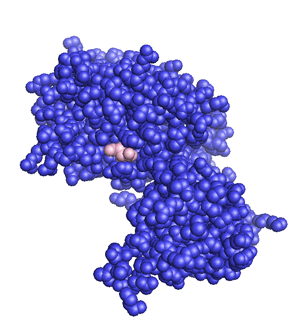PTEN (gene)
(Redirected from PTEN gene)
PTEN (phosphatase and tensin homolog) is a gene that encodes an enzyme known as phosphatase and tensin homolog. This enzyme is a protein that acts as a tumor suppressor by regulating the cell cycle, preventing cells from growing and dividing too rapidly or in an uncontrolled way. The PTEN gene is located on chromosome 10 in humans.
Function[edit | edit source]
The PTEN protein is a phosphatase that removes phosphate groups from phosphatidylinositol (3,4,5)-trisphosphate, a lipid second messenger involved in the PI3K/AKT signaling pathway. By dephosphorylating this molecule, PTEN negatively regulates the pathway, which is crucial for controlling cell growth, proliferation, and survival. This regulation helps to prevent the formation of tumors.
Clinical Significance[edit | edit source]
Mutations in the PTEN gene are associated with several types of cancer, including breast cancer, prostate cancer, and endometrial cancer. These mutations can lead to a loss of PTEN function, resulting in uncontrolled cell division and tumor growth. PTEN mutations are also linked to several inherited conditions, such as Cowden syndrome, Bannayan-Riley-Ruvalcaba syndrome, and Proteus syndrome, which are characterized by an increased risk of developing benign and malignant tumors.
PTEN and Cancer[edit | edit source]
PTEN is one of the most frequently mutated genes in human cancers. Loss of PTEN function can lead to the activation of the PI3K/AKT pathway, promoting cell survival and proliferation. This makes PTEN a critical target for cancer research and therapy. Researchers are exploring ways to restore PTEN function or inhibit the PI3K/AKT pathway in cancers with PTEN mutations.
Research and Therapeutic Approaches[edit | edit source]
Current research is focused on understanding the detailed mechanisms of PTEN regulation and its role in various cellular processes. Therapeutic approaches include developing drugs that can mimic PTEN activity or inhibit the downstream effects of its loss. Gene therapy to restore PTEN function is also being investigated.
See Also[edit | edit source]
References[edit | edit source]
External Links[edit | edit source]
Lua error in package.lua at line 80: module 'strict' not found.
Search WikiMD
Ad.Tired of being Overweight? Try W8MD's physician weight loss program.
Semaglutide (Ozempic / Wegovy and Tirzepatide (Mounjaro / Zepbound) available.
Advertise on WikiMD
|
WikiMD's Wellness Encyclopedia |
| Let Food Be Thy Medicine Medicine Thy Food - Hippocrates |
Translate this page: - East Asian
中文,
日本,
한국어,
South Asian
हिन्दी,
தமிழ்,
తెలుగు,
Urdu,
ಕನ್ನಡ,
Southeast Asian
Indonesian,
Vietnamese,
Thai,
မြန်မာဘာသာ,
বাংলা
European
español,
Deutsch,
français,
Greek,
português do Brasil,
polski,
română,
русский,
Nederlands,
norsk,
svenska,
suomi,
Italian
Middle Eastern & African
عربى,
Turkish,
Persian,
Hebrew,
Afrikaans,
isiZulu,
Kiswahili,
Other
Bulgarian,
Hungarian,
Czech,
Swedish,
മലയാളം,
मराठी,
ਪੰਜਾਬੀ,
ગુજરાતી,
Portuguese,
Ukrainian
Medical Disclaimer: WikiMD is not a substitute for professional medical advice. The information on WikiMD is provided as an information resource only, may be incorrect, outdated or misleading, and is not to be used or relied on for any diagnostic or treatment purposes. Please consult your health care provider before making any healthcare decisions or for guidance about a specific medical condition. WikiMD expressly disclaims responsibility, and shall have no liability, for any damages, loss, injury, or liability whatsoever suffered as a result of your reliance on the information contained in this site. By visiting this site you agree to the foregoing terms and conditions, which may from time to time be changed or supplemented by WikiMD. If you do not agree to the foregoing terms and conditions, you should not enter or use this site. See full disclaimer.
Credits:Most images are courtesy of Wikimedia commons, and templates, categories Wikipedia, licensed under CC BY SA or similar.
Contributors: Prab R. Tumpati, MD

